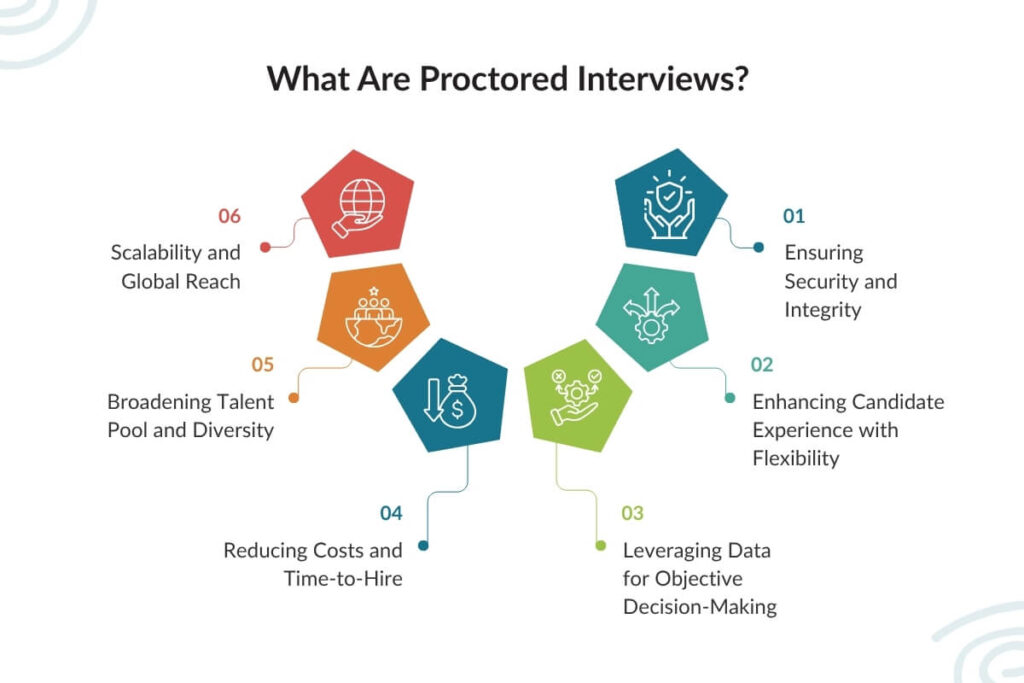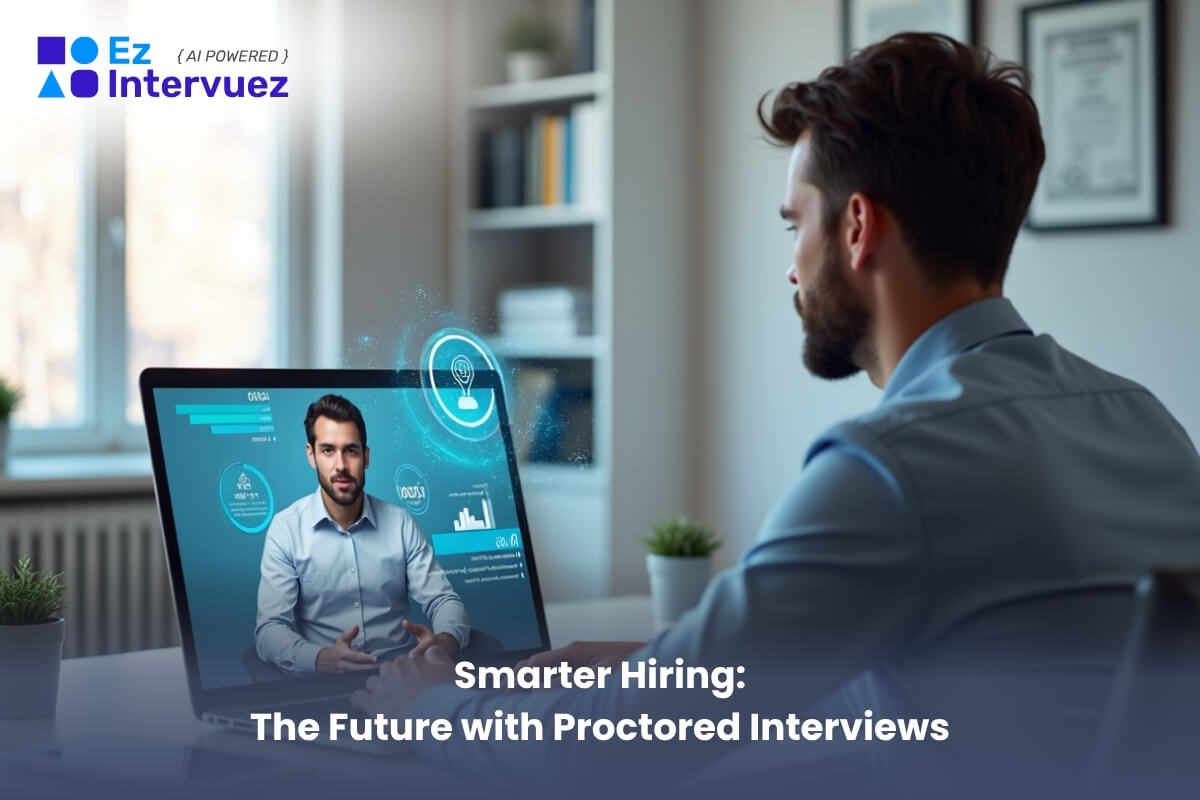The corporate world is constantly evolving, and with it, how companies assess and hire candidates. Traditional methods, like face-to-face interviews and written tests, are increasingly seen as insufficient to evaluate a candidate’s true potential. In their place, proctored interviews are emerging as a powerful tool for candidate assessment, offering a more secure, efficient, and insightful way to identify the best talent.
Proctored interviews are reshaping how businesses evaluate candidates by incorporating monitoring technologies and providing a more secure and data-driven environment. In this blog post, we will explore why proctored interviews are becoming the future of candidate assessment, highlighting their benefits, the technology behind them, and the implications for corporate hiring practices.
Curious to See How Proctored Interviews Can Secure and Streamline Your Recruitment Process?
What Are Proctored Interviews?
At its core, a proctored interview is one where a third-party system or human supervisor oversees the interview process to ensure fairness, accuracy, and integrity. Typically, this can involve monitoring the candidate remotely through webcams, microphones, and screen-sharing technologies.
Proctoring solutions often utilize advanced AI algorithms to detect suspicious behavior, such as cheating and may include features like real-time identity verification, biometric checks, and even keystroke pattern analysis. The result is a more secure and reliable interview process that minimizes the risks of candidate dishonesty or external interference. In the digital age, companies are increasingly adopting proctored interviews to improve the recruitment process.
Let’s break down why proctored interviews are quickly becoming the future of corporate hiring.

1. Ensuring Security and Integrity
In traditional, in-person interviews, it is relatively straightforward to assess a candidate’s responses, but ensuring the integrity of the process can still be challenging. With the rise of online assessments and remote interviews, there is an increased risk of candidates cheating or seeking unauthorized help, especially in technical assessments that involve coding tests, psychometric evaluations, or case studies. Proctored interviews address these concerns by preventing or identifying cheating, thereby ensuring that the candidate’s responses are genuinely their own.
Proctored interviews help to safeguard the interview process against external assistance by utilizing a combination of biometric facial recognition, screen recording, and browser lockdown technology. AI-powered proctoring tools can also detect unusual patterns, such as rapid scrolling through answers or multiple tabs being opened, which are often telltale signs of dishonesty. These advanced monitoring tools not only ensure a level playing field but also help companies adhere to stringent security standards, especially in sensitive industries such as finance, healthcare, and government.
2. Enhancing Candidate Experience with Flexibility
One of the most compelling reasons for the rise of proctored interviews is the flexibility they offer both candidates and employers. Traditional hiring processes often require candidates to attend an in-person interview, which can be logistically challenging, particularly for those located in different regions or countries. With the integration of proctored video interviews, candidates can complete the interview from anywhere with an internet connection, breaking down geographical barriers and enabling companies to tap into a global talent pool.
The asynchronous nature of many proctored interview platforms also enables candidates to take assessments at a time that suits them, which is especially beneficial for people with differing time zones or busy schedules. This flexibility can improve the candidate experience by eliminating the stress and pressure of scheduling conflicts and last-minute travel arrangements. It also allows companies to collect a more diverse set of candidates, as location and time zone restrictions are minimized.
3. Leveraging Data for Objective Decision-Making
The value of data in hiring decisions cannot be overstated. Traditional interviews, though valuable in assessing interpersonal communication and cultural fit, can be highly subjective, with interviewers potentially influenced by unconscious biases or inconsistent evaluation standards. Proctored interviews, on the other hand, generate rich data on each candidate’s performance, providing recruiters with a more objective basis for evaluating qualifications.
For example, automated scoring tools can evaluate a candidate’s answers to pre-set questions based on a set of pre-defined criteria, ensuring that all candidates are measured against the same standards. Additionally, proctored assessments often capture detailed metrics such as response time, accuracy, and thought process, enabling recruiters to make data-backed decisions. In technical assessments, platforms can record the candidate’s coding logic, the steps they take to solve a problem, and the time spent on each section, offering a deeper insight into their problem-solving skills than simply assessing the final answer.
By utilizing data-driven hiring tools, companies can mitigate bias, improve fairness in the hiring process, and ensure that their selection methods are based on merit rather than subjective judgment.
Ready to Enhance Your Hiring Process with the Power of Artificial Intelligence?
4. Reducing Costs and Time-to-Hire
The recruitment process is often time-consuming and resource-intensive, particularly when it involves scheduling interviews, coordinating with multiple stakeholders, and conducting multiple rounds of assessments. Proctored interviews help reduce these costs by automating significant portions of the interview process.
Automated proctoring solutions can quickly screen large volumes of applicants, flagging those who fail to meet predefined criteria or show suspicious behavior. With remote proctoring, companies can conduct interviews at scale, reducing the need for travel, venue rental, or logistical support, all of which contribute to the cost and time investment of traditional interview processes.
Moreover, the use of AI-powered tools allows for faster decision-making. AI algorithms can analyze the data from an interview in real time, providing immediate insights and flagging any issues that require human intervention. This reduces the need for lengthy review cycles and speeds up the overall time-to-hire, which is crucial in a competitive job market.
5. Broadening Talent Pool and Diversity
Proctored interviews offer companies the opportunity to expand their talent pool beyond geographic boundaries, allowing them to access candidates from different cultures, backgrounds, and skill sets. The ability to conduct interviews asynchronously and remotely eliminates the need for candidates to travel, which can be a significant barrier for many qualified individuals.
Additionally, by reducing human bias through standardized assessments and AI-based scoring, proctored interviews can promote a more inclusive hiring process. For example, a machine-learning algorithm can be trained to detect patterns that align with job performance rather than relying on human judgment that may be unconsciously biased towards certain demographics or personality traits. As a result, organizations can more effectively source diverse talent, leading to better innovation, problem-solving, and business outcomes.
6. Scalability and Global Reach
As companies grow, the scalability of the recruitment process becomes a key challenge. Proctored interviews are inherently scalable because they allow organizations to assess large numbers of candidates simultaneously without compromising the quality of the evaluation process. AI-driven tools can handle hundreds or even thousands of interviews without human intervention, automatically scoring responses, flagging anomalies, and generating reports for hiring managers to review.
Furthermore, proctored interviews facilitate global recruitment. Businesses can seamlessly conduct interviews with candidates from any part of the world, all while maintaining the same high standards of integrity and security. This level of scalability and reach is invaluable for multinational companies looking to recruit top talent across various markets and regions.
Use Cases of Proctored Interviews
Proctored interviews are finding applications across various industries and roles:
- IT and Software Development: Assessing coding skills, problem-solving abilities, and technical knowledge through live coding challenges and technical interviews.
- Finance and Banking: Evaluating candidates for roles requiring numerical reasoning, analytical skills, and financial acumen.
- Customer Service and Sales: Assessing communication skills, interpersonal abilities, and sales aptitude through role-playing scenarios and behavioral interviews.
- Education and Training: Conducting online exams, certifications, and assessments while ensuring academic integrity.
Best Practices for Implementing Proctored Interviews
To ensure the effectiveness and fairness of proctored interviews, companies should consider the following best practices:
- Transparency: Clearly communicate the proctoring process to candidates beforehand, explaining the reasons for its implementation and addressing any privacy concerns.
- Candidate Training: Provide candidates with clear instructions and practice tests to familiarize them with the proctoring software and procedures.
- Technical Support: Offer technical assistance to candidates in case they encounter any issues during the proctored interview.
- Data Privacy: Ensure compliance with data privacy regulations and obtain candidate consent for data collection and processing.
- Ethical Considerations: Implement proctoring solutions responsibly, considering potential biases and ensuring fair and equitable assessment for all candidates.
The Future of Proctored Interviews
Proctored interviews are poised to become even more sophisticated with advancements in AI and machine learning. Future trends include:
- Increased personalization: AI-powered proctoring solutions will be able to adapt to individual candidates, providing a more personalized and engaging assessment experience.
- Enhanced security measures: Advanced techniques like voice recognition and biometric authentication will further strengthen the security of proctored interviews.
- Integration with other HR tools: Proctored interviews will be seamlessly integrated with other HR systems, such as Applicant Tracking Systems (ATS) and Learning Management Systems (LMS), to streamline the entire hiring and training process.
Conclusion
As technology continues to evolve, proctored interviews are poised to become a mainstay in the corporate hiring process. Proctored interviews provide a comprehensive solution to many of the challenges organizations face in hiring by offering enhanced security, improving candidate experience, leveraging data for objective decision-making, and reducing costs. As more companies adopt this technology, we can expect a future where recruitment is more efficient, more inclusive, and more secure, ultimately helping organizations make better, data-driven decisions in the talent acquisition process.
In an increasingly digital and globalized world, proctored interviews represent the next logical step in the evolution of candidate assessment. Whether through video, AI, or machine learning, proctored interviews promise to streamline the hiring process, enhance fairness, and allow organizations to identify and retain the best talent more effectively than ever before.
Ready to level up hiring with intelligent, data-driven interviews?
